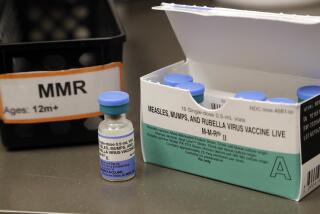Tests Urged for Students Poked With Needles
- Share via
LAKE LOS ANGELES — Twenty-one middle-school students who were poked with needles brought to campus by a classmate should be tested for hepatitis, school officials have recommended.
In what Principal Greg Gerard called a “bizarre” incident, a student took blood test needles belonging to her diabetic grandmother to Challenger Middle School last week.
Some students were poked with the needles, some several times either by choice or maliciously, officials said. The student who brought the needles to school handed them to a classmate, who then poked other students, officials said.
“Some kids were being poked, some were saying, ‘Poke me again,’ ” said Gerard. “It’s kind of bizarre, the whole incident.”
At least two students at the 675-student school, which serves grades six through eight, may be expelled as a result of the incident. Gerard said two students were suspended and face an expulsion hearing March 17.
Gerard doubts the students realized the potentially deadly act they were engaging in. “I don’t think they saw it as being anything serious or malicious. A typical kid thing, perhaps. I don’t think there was any intent to create a health problem.”
Supt. Chet Caldeira said his “biggest concern (is) the health of the students involved. We’re just hopeful there is no contamination or spread of any disease because of this.”
Health officials said it is unlikely the students exposed themselves to the human immunodeficiency virus (HIV) or hepatitis B by poking one another with the small needles, used by diabetics to prick the skin to get drops of blood to test for blood-sugar levels.
“There’s a very, very small risk,” said Dr. Shirley Fannin, director of disease-control programs for the Los Angeles County Department of Health Services. “This happens to be the group with the lowest level of hepatitis B and the lowest level of HIV. The 5- to 14-year-old has the lowest prevalence in the county.”
At the same time, however, Fannin said, “if you’re looking for reassurance that it couldn’t possibly happen, that there wouldn’t be exposure to hepatitis B, I couldn’t give that.”
The incident occurred Feb. 28, although school officials did not become aware of it until the next day, when parents contacted the school, Caldeira said. The parents of the 21 students who are believed to have been pricked with the needles were advised by the school to seek medical assistance to test for hepatitis. As for HIV testing, officials said students should follow the advice of their doctors.
“We have contacted our insurance carrier,” Caldeira said. “The student insurance will be made available to those students who seek medical attention.”
Most parents are heeding the school’s advice, he said. “There’s a high level of concern among parents for their children.”
Fannin recommended that the students who were pricked receive a tetanus booster, which the school started making available last week.
A majority of the students have already taken up the school’s offer to receive the injection, Gerard said.
As for HIV and hepatitis B testing, Fannin said it will be some time before the students can do that.
“If you got a transmission of, say, hepatitis B, the incubation period is six weeks to six months,” she said. “With HIV, the earliest is three weeks and usually three months to six months.”
Besides the 21 students, the school’s vice principal was accidentally poked with one of the needles as he was searching the student who brought them to school, Gerard said.
In hopes of preventing a similar incident from occurring, Gerard said all the students have been spoken to about the seriousness of the incident. A letter was also sent to the entire student body.
More to Read
Sign up for Essential California
The most important California stories and recommendations in your inbox every morning.
You may occasionally receive promotional content from the Los Angeles Times.













